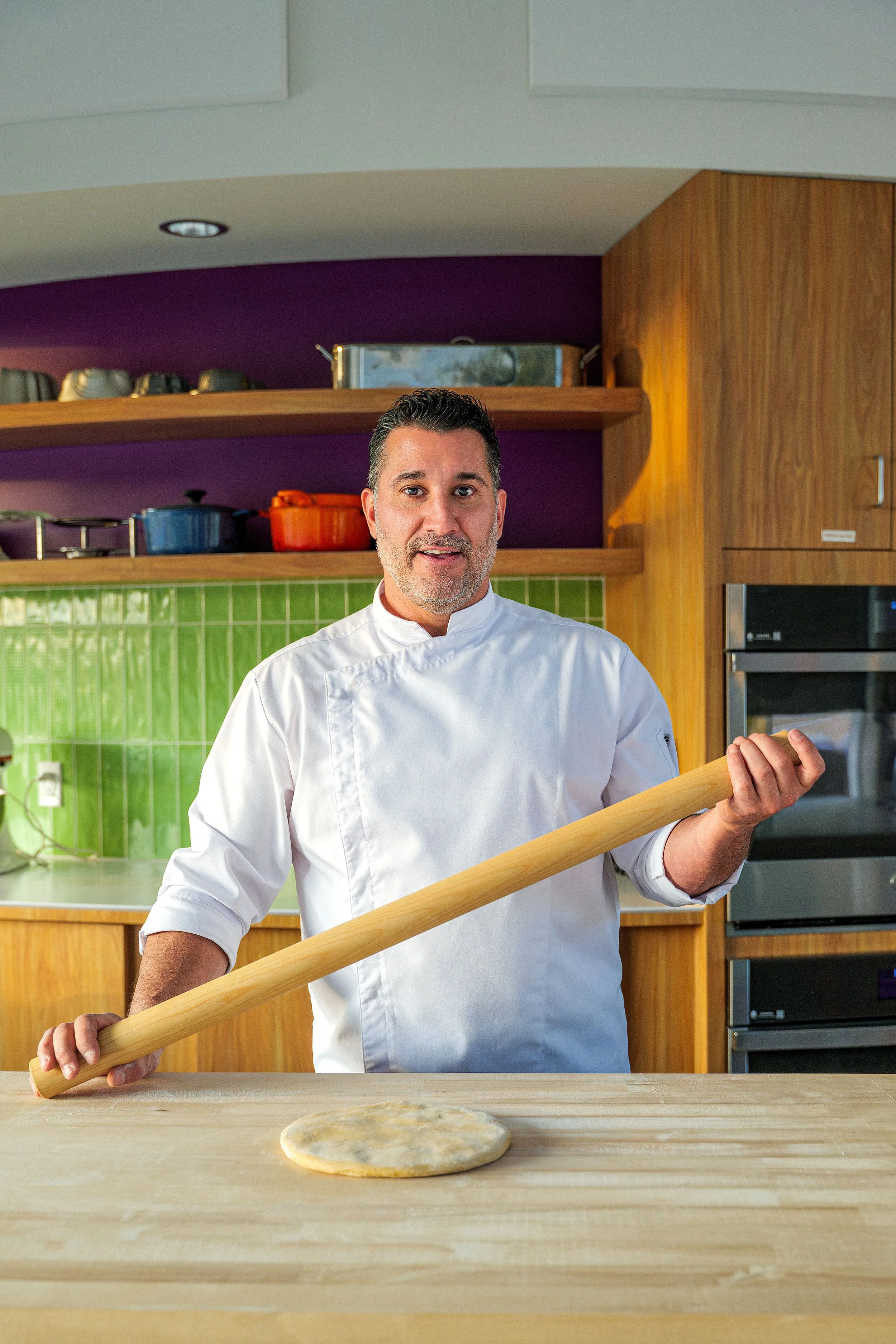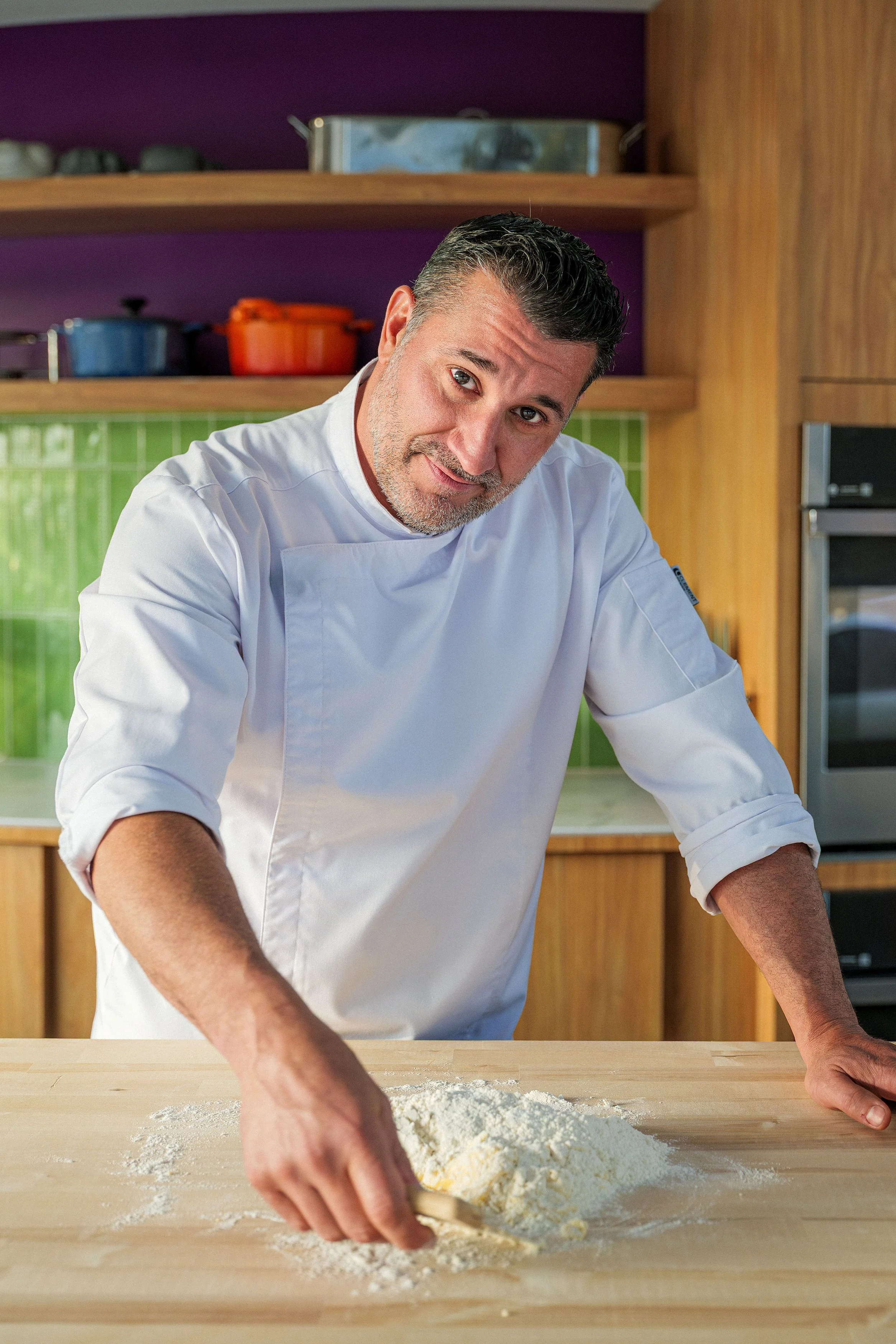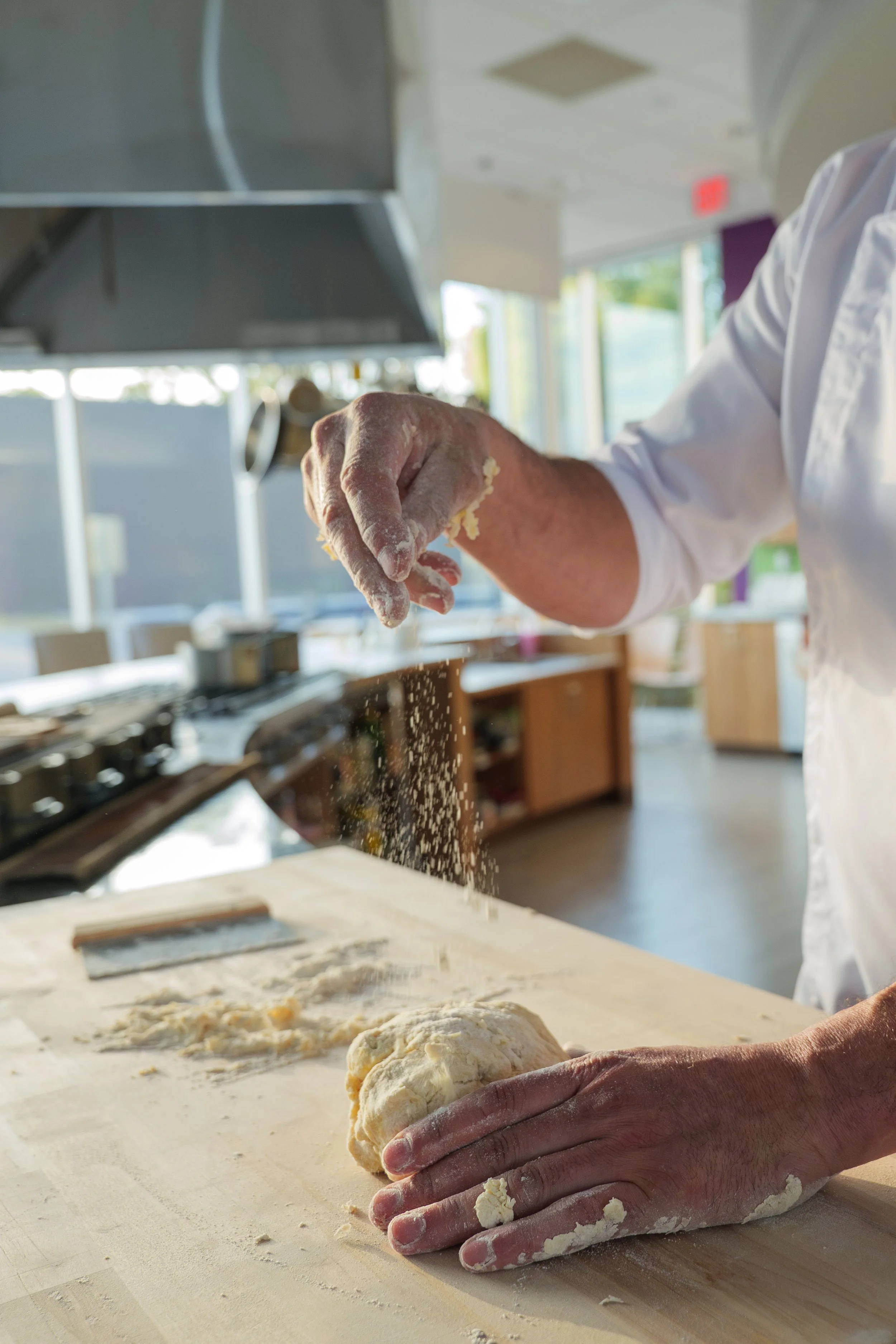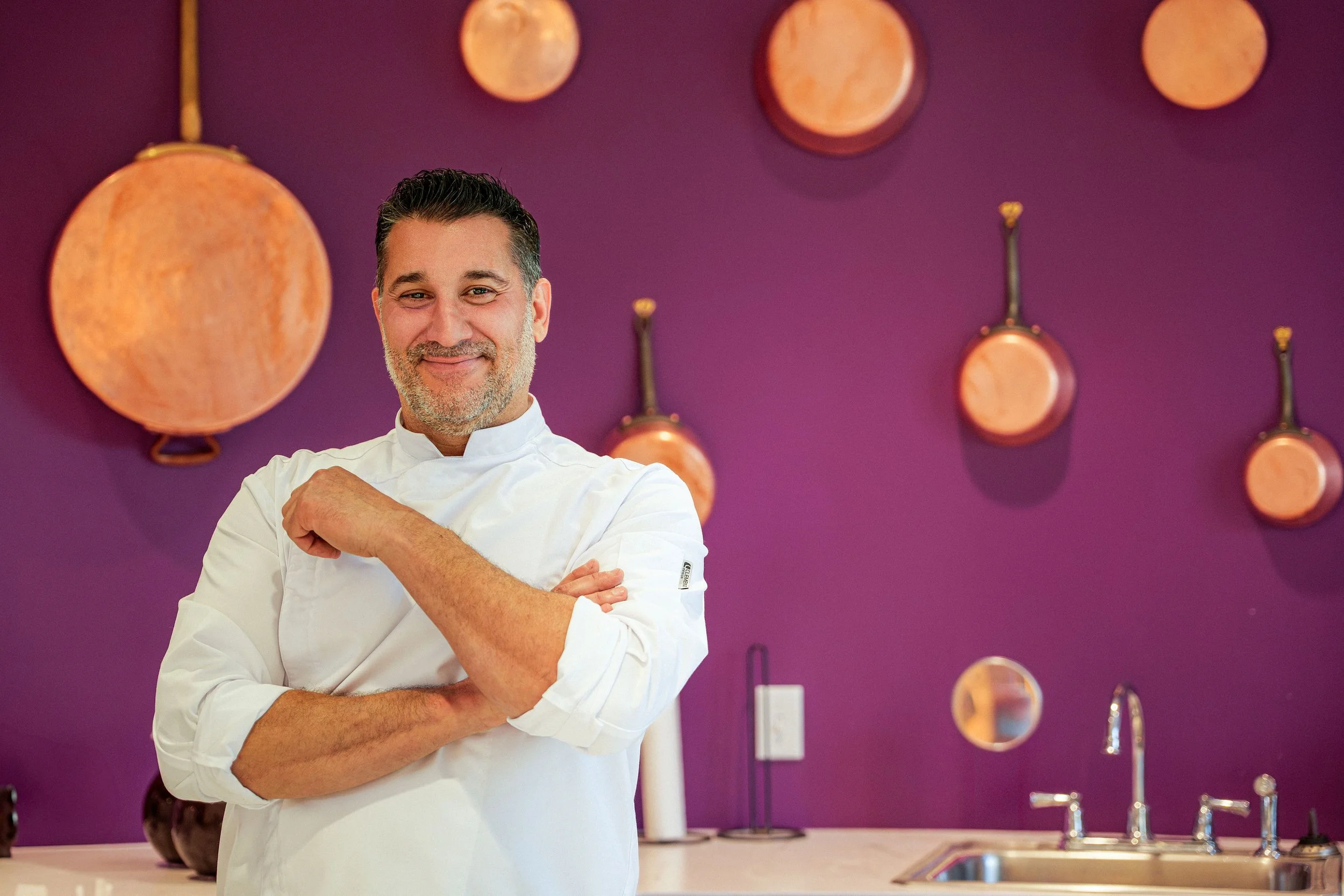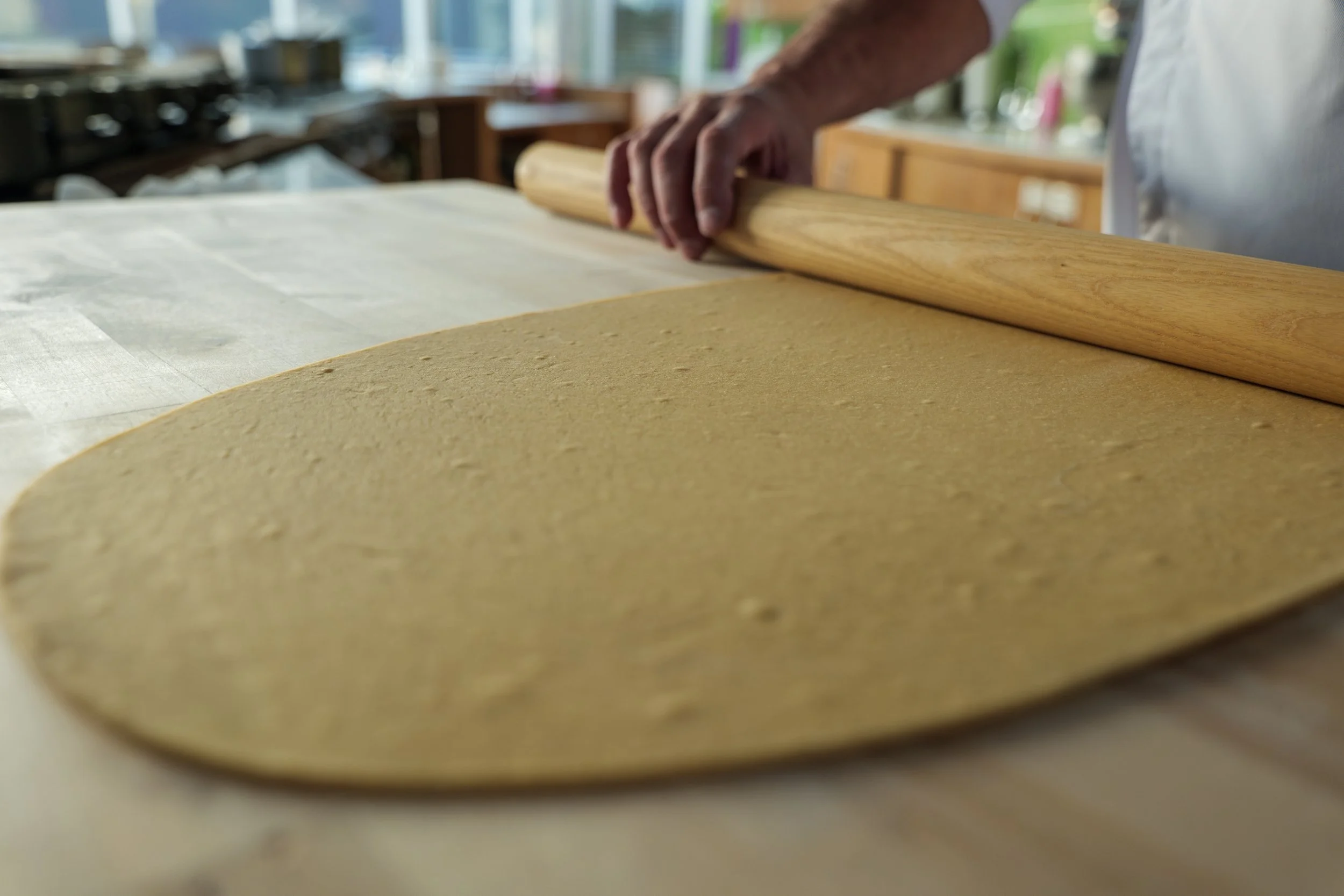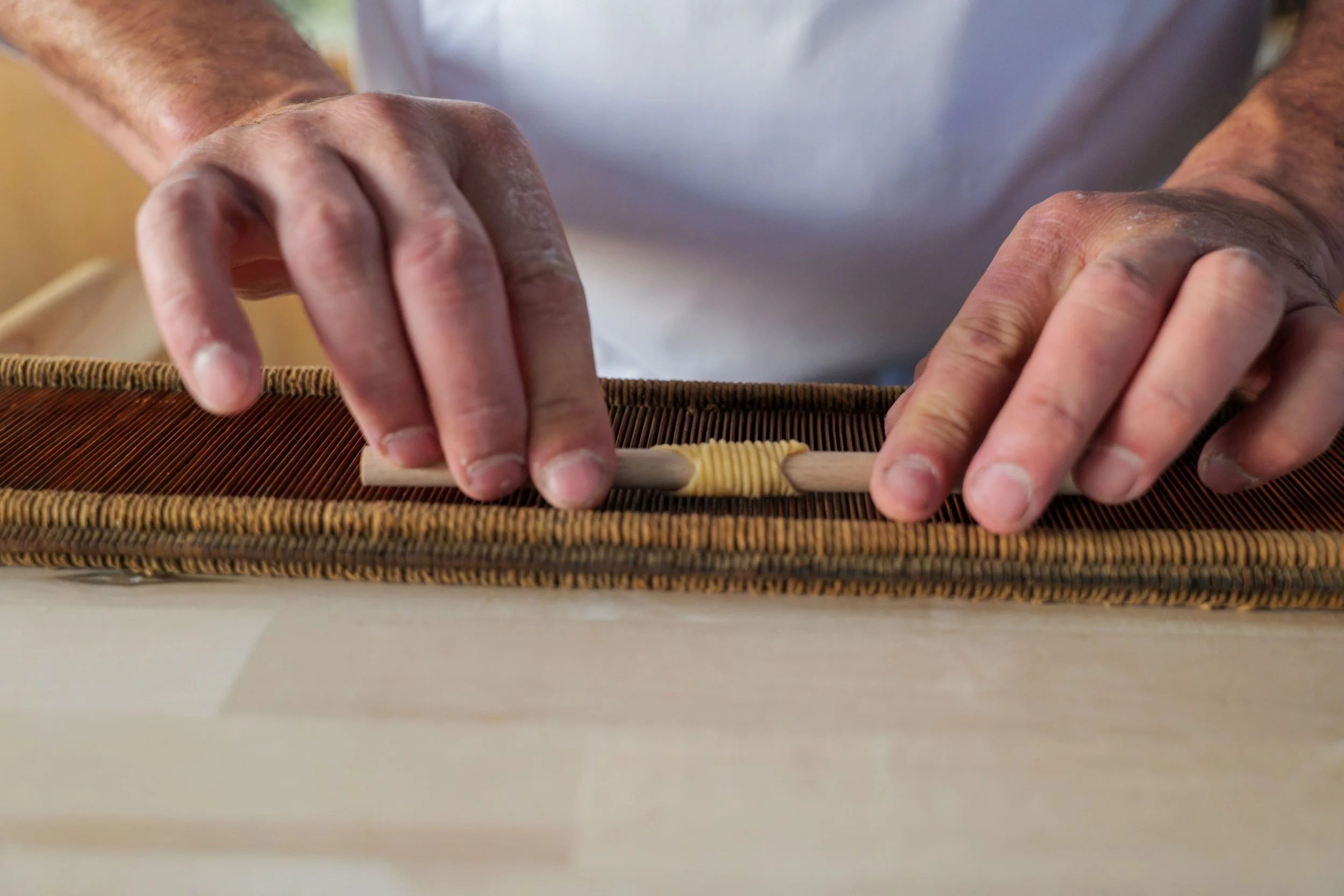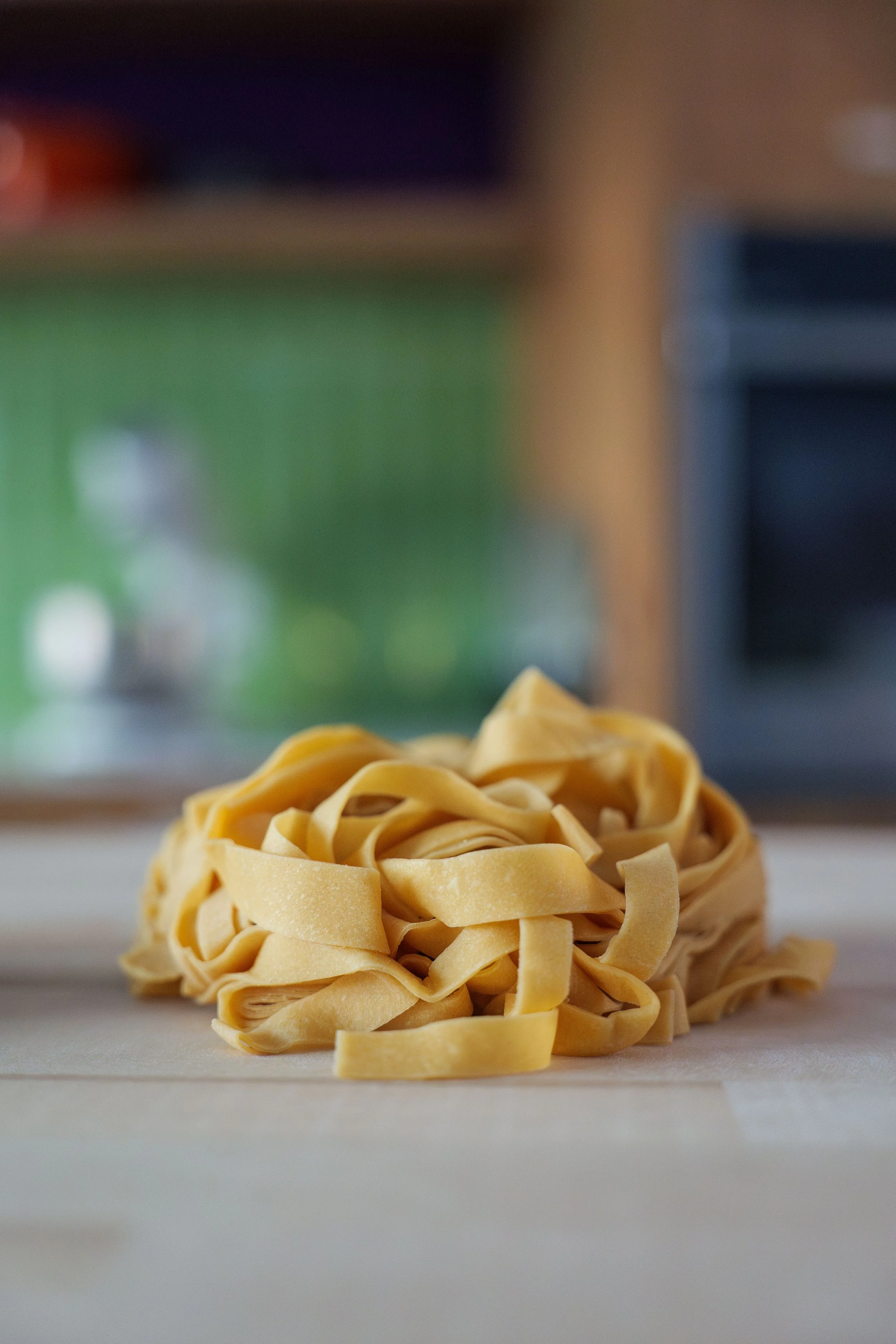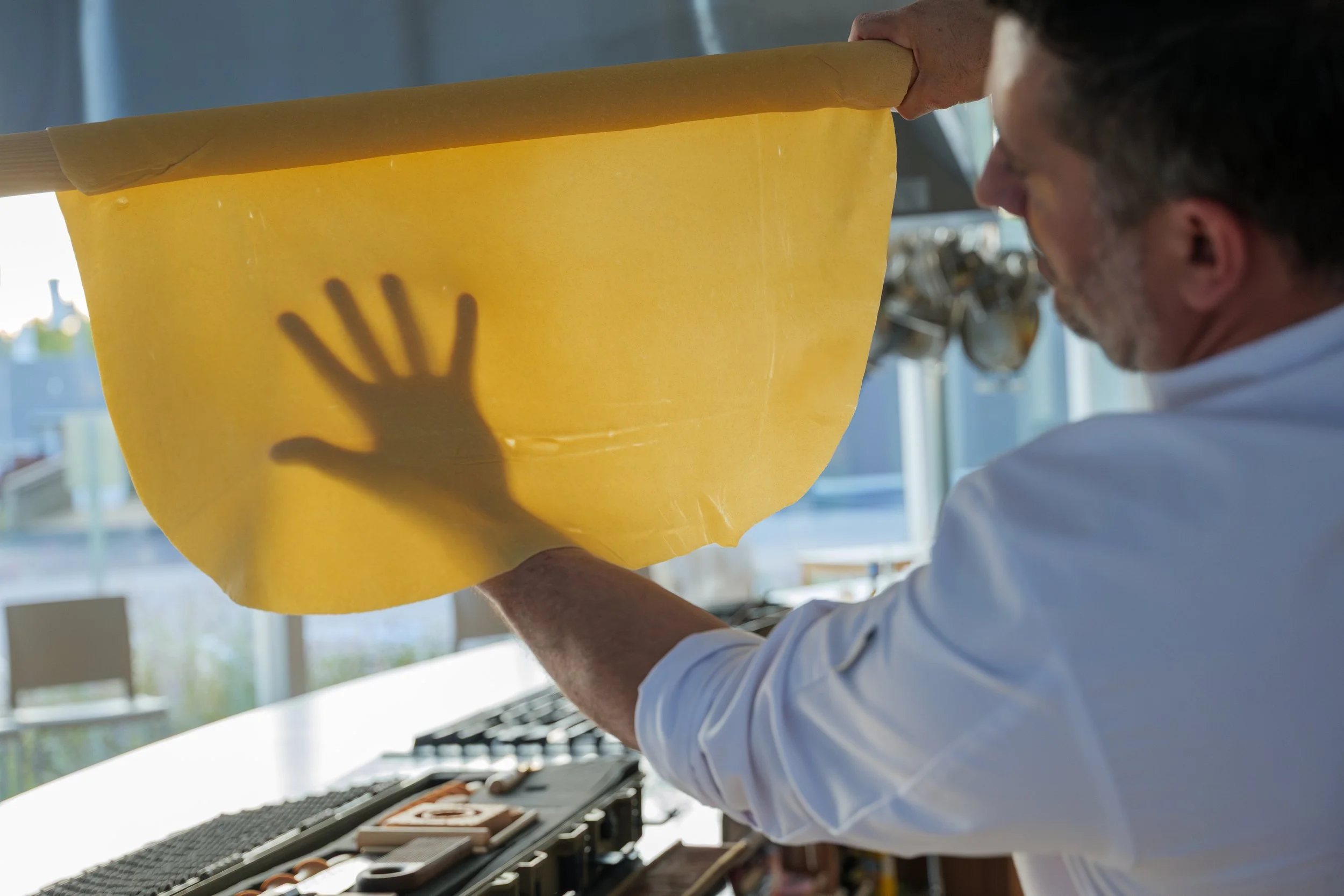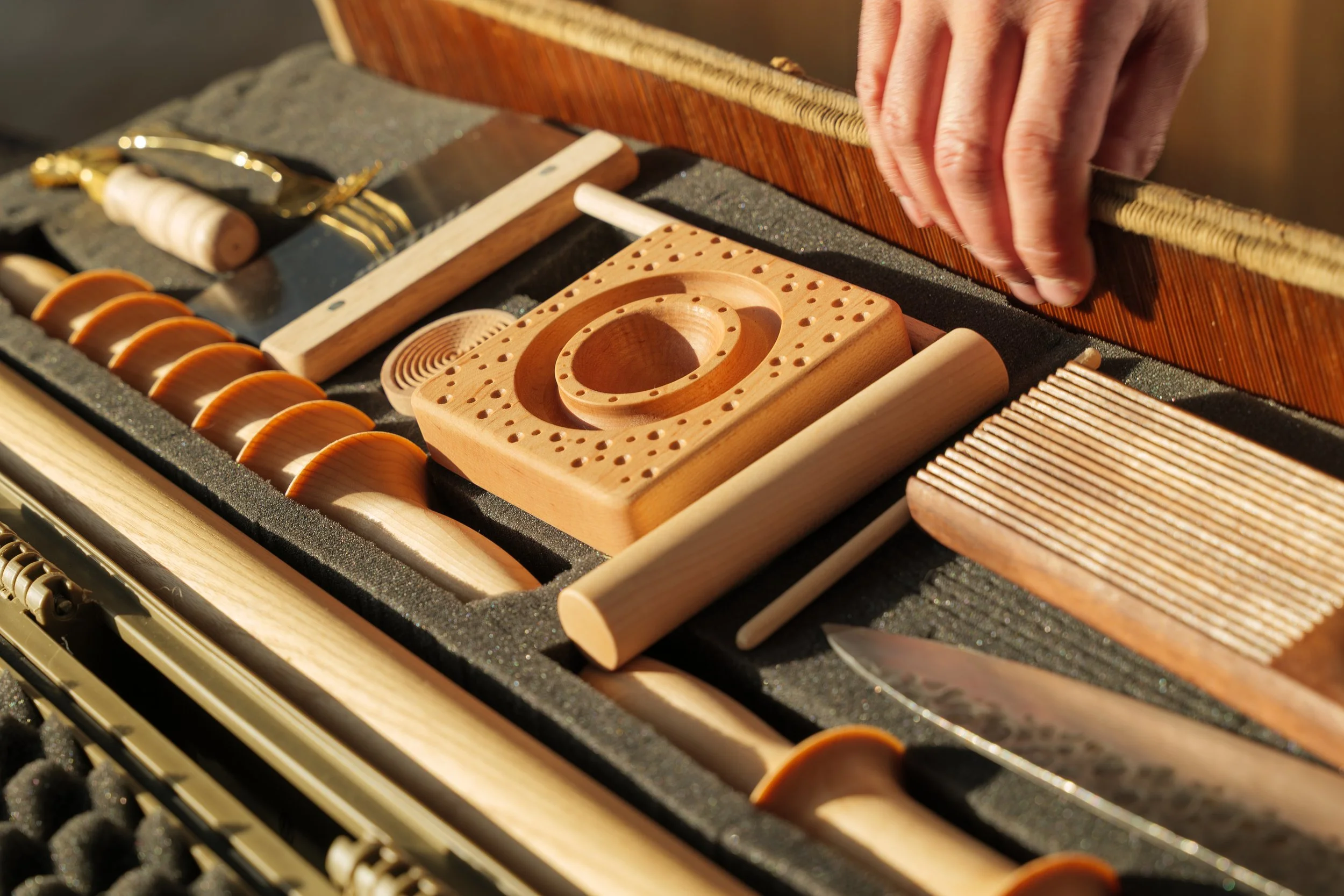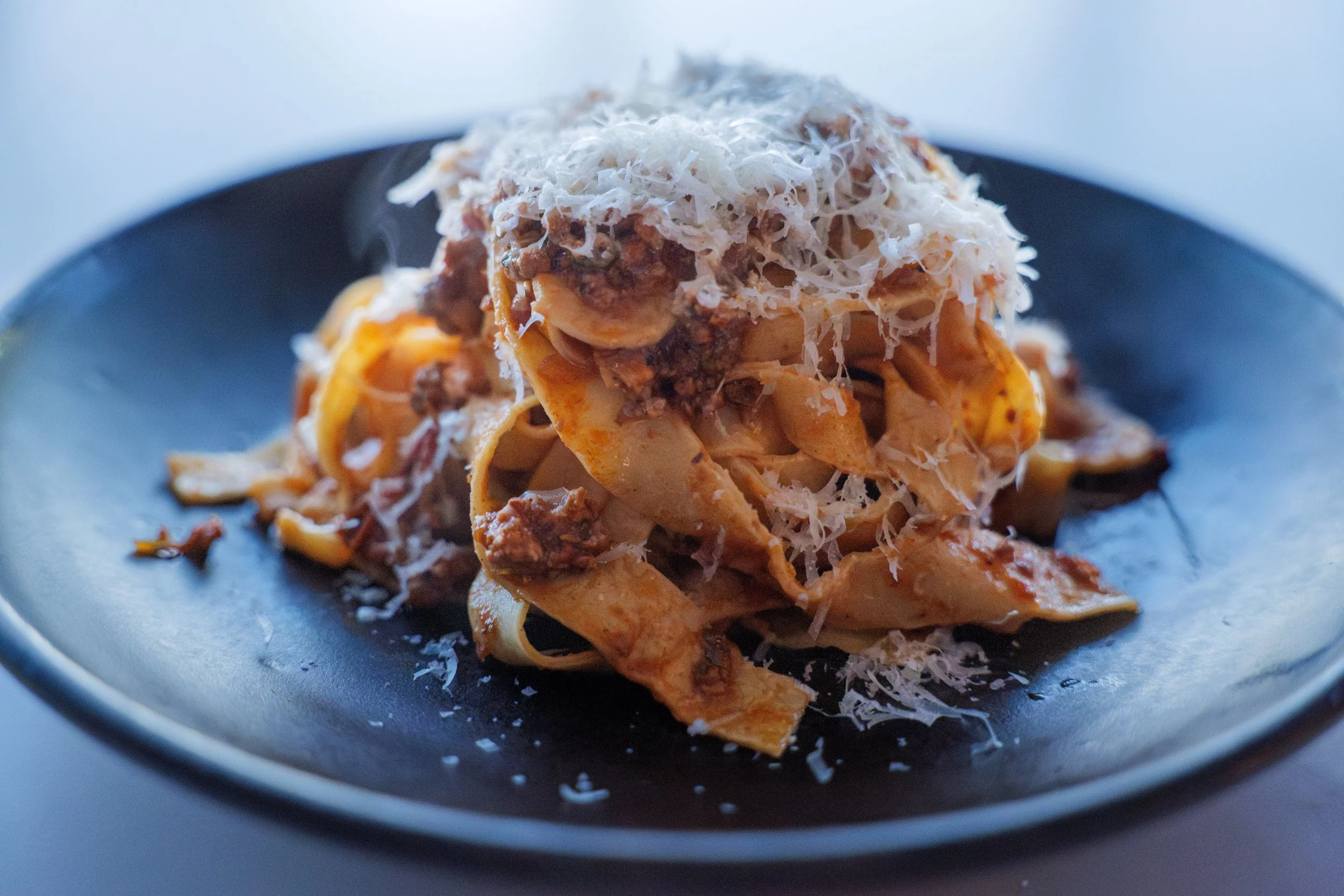A Pasta Assassin
Truffles’ long time executive chef, a master of hand-rolled pasta, is now making house calls.
by Christy Marshall / photos by John Lore
Brandon Benack shows up to your house looking like he's about to commit a crime. He’s got a gun case slung over his shoulder and a massive cutting board tucked under his arm.
Fear not.
That case holds his collection of antique pasta-making tools. That cutting board becomes the stage for the resurrection of centuries-old Italian pasta traditions that most people have never seen.
"I walk up looking like a pasta assassin," Benack laughs, describing his arrival at clients' homes for his increasingly popular pasta dinner experiences. It's a fitting description for a guy who's basically waging war against everything you thought you knew about fresh pasta.
After 13 years as the executive chef at Truffles — one of St. Louis's most beloved restaurants, Benack made the leap into entrepreneurship last year. But his path there was anything but traditional, much like the pasta he's now obsessed with making.
Growing up in Rochester, New York, Benack had his sights set on college basketball. That plan lasted until an injury derailed his hoop dreams at SUNY Morrisville. Sitting with his roommate, contemplating his next move, the friend made a suggestion: “‘Why don't you just switch to culinary? We make pancakes and hang out, it's fun and easy,’" Benack recalls.
What made the transition seamless was Benack's background. He comes from what he calls "the most stereotypical Italian American family" — Calabrese roots, his mother owned a beauty salon, his grandparents helped raise him, his grandfather brought vines over from Italy to make wine. His grandmother started cooking on Wednesday for Sunday dinner for 50 to 60 people. “I got involved in that,” Benack says.
"Every single stereotype you could think of, that's what we were. The big garden, my grandfather making wine — the whole nine yards."
His Uncle Angelo was an old-school butcher who walked around with an unlit cigar perpetually in his mouth.
"Uncle Angelo would take me to the wholesale markets when I was a kid," Benack remembers. "He'd pick up a piece of beef, smell it, touch it and tell me everything about the animal. He taught me that respecting your ingredients starts with understanding them."
That foundation served him well as he moved through the culinary world without ever having to write a resume. One job led to another, from an internship at a private golf resort on Daufuskie Island off Hilton Head, to New Orleans working for Emeril and at Delmonico's.
Then one night a billionaire named Alan Stanford swept into the restaurant and offered the executive chef a deal that was too good to refuse. The chef then recruited Benack and Aleks Jovanovic and off they flew to Antigua, where Stanford was building a culinary empire complete with ultra-fine dining restaurants, cricket fields and helicopter arrivals with million-dollar cash prizes.
"We only opened the restaurant if you had a reservation," Benack recalls of their ultra-exclusive spot, The Pavilion. "I remember we had Eli Manning after the Super Bowl that year. Eli and two people." The restaurant was opened for a table of three.
The fairy tale ended when Stanford's empire crumbled. He's now in maximum security prison serving 110 years for running the second-largest Ponzi scheme in world history.
After bouncing through Miami and working with celebrity chefs like Norman Van Aken, Benack found himself at a career crossroads in 2011. He couldn't nail a job interview to save his life. After years of opportunities falling into his lap, he had no idea how to sell himself sitting across from strangers.
"I bombed every interview," he admits. "I think I went home and cried myself to sleep two days in a row. It was the most humbling thing that ever happened to me, but probably one of the best things because it really knocked me off this pedestal."
Salvation came through Jovanovic, who'd landed at Truffles in St. Louis. The pitch was simple: come to the Midwest, put the band back together and take the restaurant to the next level.
He moved to St. Louis on April 1, 2012 — April Fool's Day, he's quick to point out — and spent the next 13 years helping make Truffles a destination. Along the way, Benack and the restaurant’s team developed Trufffles Butchery Market next door, inspired by his Uncle Angelo's old-school approach.
"People would come in for dinner and see this beautiful display of dry-aged steaks and house-made charcuterie and they'd ask if they could take some home," Benack explains. "Uncle Angelo always said a good butcher feeds the community, not just the restaurant. So we started feeding the community."
About eight years into his Truffles tenure, Benack started tinkering with cars as therapy. Working in restaurants means dealing with "a hundred fires going on every day," but in the garage, he could focus on just one thing at a time.
What began as a hobby with business partner Harden Ervin evolved into Classic Motoring STL, a serious side business specializing in Alfa Romeo restorations. They're now the go-to Alfa specialists for the entire Midwest, drawing customers from Washington D.C. to Colorado. Benack bought property in Melville for the operation.
For the next eight years, Benack lived a punishing schedule: up at 6 a.m., in the shop by 7, work until 2, shower, get to the restaurant by 3, work until 10 or 11 p.m. Six days a week. "I got to the point where I'm like, ‘man, I don't know if I can do this anymore’," he says.
The decision to leave Truffles wasn't easy. The Cellas, who own the restaurant, are "probably the best people I've ever worked for." But after 13 years, Benack needed a new challenge.
He chose the new challenge.
Over the years, Benack became obsessed with traditional pasta making — not just fresh pasta, but pasta made the way his grandmother did it, the way it's been done in Italian villages for centuries.
"I spent 30 years of my career working in all these high-end kitchens making fresh pasta, but we'd always use a sheeter [pasta machine]," he explains. "The problem is, you take this beautiful dough that you knead and incorporate all these beautiful air pockets and air bubbles, then you shove it in this machine and smash the living hell out of it. You kill everything you just worked for."
The traditional method uses a mattarello — a massive rolling pin anywhere from 35 to 42 inches long. Instead of destroying the air bubbles, hand-rolling disperses them into microscopic pockets throughout the dough, creating a completely different texture and making it easier to digest.
"When you take dough run through a sheeter, it’s like pound cake compared to a wafer," Benack says. "Your body actually processes it differently. You ever have a big bowl of pasta and just feel like, 'Oooh, man?!' Well, you don't with this."
His timing was perfect. His mother had been researching their family history and connected with distant cousins still living in Calabrese. Meanwhile, Benack discovered Evan Funke, a chef in Los Angeles who's the only person in the country doing traditional pasta at restaurant level, with full pasta labs where everything is rolled out by hand.
Benack started collecting antique pasta-making tools, including a 200-year-old pettine for making different pasta shapes. He called his friend, local woodworker David Stine, who makes custom bar tables for restaurants around town and asked him to craft a huge cutting board, suitable for rolling out pasta.
When Benack announced he was leaving Truffles, his regular customers had one question: Where were they going to find him now? The answer evolved into his current pasta dinner venture, as well as in-house tasting dinners.
These aren't cooking classes in the traditional sense, though Benack originally called them that before realizing it confused people. They're intimate dinner experiences where he brings restaurant-quality food and old-world techniques directly into clients' homes.
"It's bringing the restaurant to the house," he explains. The experience is completely customizable. Some clients want to get hands-on, rolling out dough and shaping pasta alongside Benack. Others prefer to sit back with a glass of wine and watch the master at work.
Benack arrives with his rifle case of tools, his massive cutting board and pre-rested dough that's been developing for 24 hours. He'll make fresh dough on-site to demonstrate the technique, prepare multiple sauces, create salads and appetizers and craft several pasta courses depending on what clients want.
The price point — $2,000 to $2,500 for the pasta dinners — is significantly more accessible than his elaborate six-course tastings that start at $3,500 (not including food). More importantly for the chef, the pasta nights are more fun and sustainable.
Benack has developed a core team for clients who want the full experience: sommeliers for wine pairings, servers, bartenders, even cleanup crews. He can accommodate up to 20 people, though 10 to 15 is the sweet spot for pasta dinners due to the labor-intensive nature of hand-rolling everything.
The consultation process starts with a phone conversation to discuss the client's vision and kitchen space ("I'm not coming into a loft apartment where the counter is this big" he says signaling a not-very-big area), followed by an in-person visit a week or two before the event to finalize details.
Word of mouth is driving demand. A recent event in Ladue led to a slew of referrals. Benack has partnered with Kitchen Conservatory for some classes and signed up to offer experiences through Airbnb, where he's one of only two private chefs listed for the entire St. Louis market.
The responses are consistent: guests are amazed by how much work goes into what they assumed was a simple bowl of pasta. "Every single person I've done this for says, 'Oh my God, I had no idea how much work it takes to make this one little bowl,'" Benack notes. "It makes it that much more special."
For someone who spent three decades climbing the ladder in professional kitchens, working in resort restaurants and celebrity chef empires, Benack has found something unexpected in these intimate home gatherings: pure joy in sharing traditions that connect us across centuries.
"People have never seen it done like this," he says. "That's where the challenge comes in. It's just challenging."

